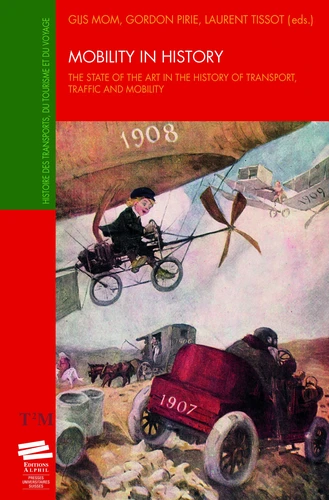Mobility in History. The State of the Art in the History of Transport, Traffic and Mobility
Par : , ,Formats :
Disponible dans votre compte client Decitre ou Furet du Nord dès validation de votre commande. Le format Multi-format est :
- Pour les liseuses autres que Vivlio, vous devez utiliser le logiciel Adobe Digital Edition. Non compatible avec la lecture sur les liseuses Kindle, Remarkable et Sony
 , qui est-ce ?
, qui est-ce ?Notre partenaire de plateforme de lecture numérique où vous retrouverez l'ensemble de vos ebooks gratuitement
Pour en savoir plus sur nos ebooks, consultez notre aide en ligne ici
- Nombre de pages260
- FormatMulti-format
- ISBN978-2-940489-70-1
- EAN9782940489701
- Date de parution01/12/2009
- Protection num.NC
- Infos supplémentairesMulti-format incluant ePub avec ...
- ÉditeurAlphil-Presses universitaires su...
Résumé
For decades scholars in diverse fields have examined problems in the history of mobility. Their diversity was their strength but also their limitation, as disciplinary boundaries impeded the exchange of ideas that lets scholarship flourish. Since 2003 the International Association for the History of Traffic, Transport and Mobility (T2M) has served as a free-trade zone, fostering a new interdisciplinary vitality in a now-flourishing field.
Now, with the publication of its first yearbook, T2M has surveyed these gains in the form of a comprehensive state-of-the-art review of research in the field. Here, twenty-seven scholars in the history of mobility, from sixteen countries and five continents, present synopses of recent research. Besides reviews of research in thirteen countries, contributions also include thematic reviews relating mobility to the environment, automobile fetishism, race, gender, and other transnational themes.
All in all, more than sixty scholars within and beyond T2M cooperated in this project, making it a truly collective work.
Now, with the publication of its first yearbook, T2M has surveyed these gains in the form of a comprehensive state-of-the-art review of research in the field. Here, twenty-seven scholars in the history of mobility, from sixteen countries and five continents, present synopses of recent research. Besides reviews of research in thirteen countries, contributions also include thematic reviews relating mobility to the environment, automobile fetishism, race, gender, and other transnational themes.
All in all, more than sixty scholars within and beyond T2M cooperated in this project, making it a truly collective work.
For decades scholars in diverse fields have examined problems in the history of mobility. Their diversity was their strength but also their limitation, as disciplinary boundaries impeded the exchange of ideas that lets scholarship flourish. Since 2003 the International Association for the History of Traffic, Transport and Mobility (T2M) has served as a free-trade zone, fostering a new interdisciplinary vitality in a now-flourishing field.
Now, with the publication of its first yearbook, T2M has surveyed these gains in the form of a comprehensive state-of-the-art review of research in the field. Here, twenty-seven scholars in the history of mobility, from sixteen countries and five continents, present synopses of recent research. Besides reviews of research in thirteen countries, contributions also include thematic reviews relating mobility to the environment, automobile fetishism, race, gender, and other transnational themes.
All in all, more than sixty scholars within and beyond T2M cooperated in this project, making it a truly collective work.
Now, with the publication of its first yearbook, T2M has surveyed these gains in the form of a comprehensive state-of-the-art review of research in the field. Here, twenty-seven scholars in the history of mobility, from sixteen countries and five continents, present synopses of recent research. Besides reviews of research in thirteen countries, contributions also include thematic reviews relating mobility to the environment, automobile fetishism, race, gender, and other transnational themes.
All in all, more than sixty scholars within and beyond T2M cooperated in this project, making it a truly collective work.





